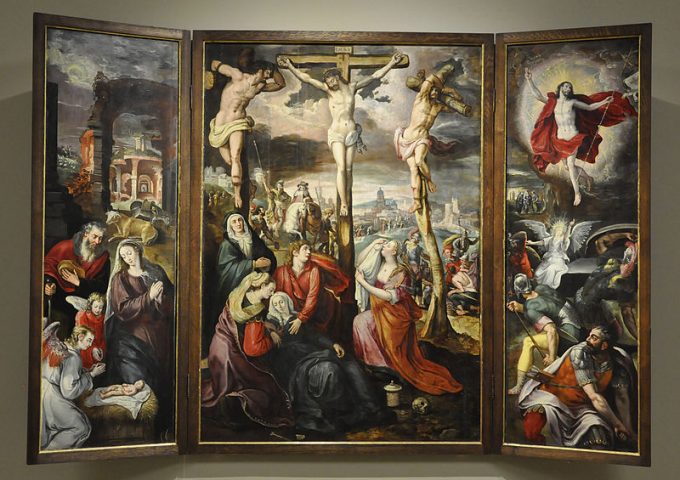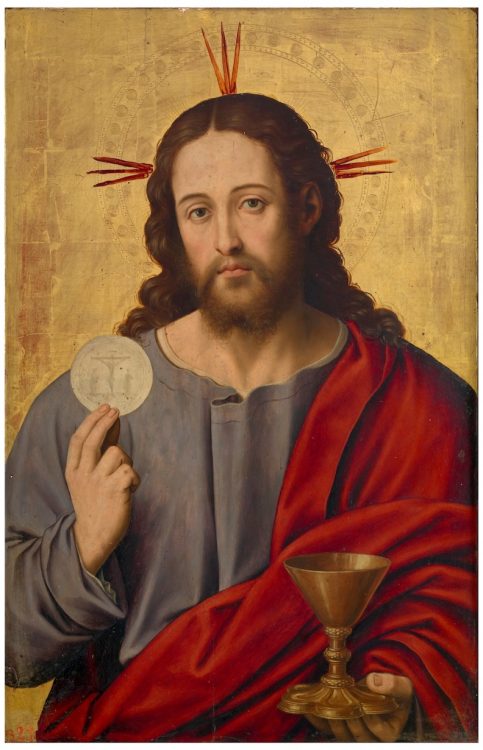 The word “catechesis” comes from the Greek word “to teach.” It means what is taught, what is held. We do not teach “teaching.” We teach something. Nor does “learning” consist in repeating the professor’s opinions. It deals with knowing what is true for both the teacher and the taught. We are not interested in what a professor maintains, but in whether what he teaches is true or not. Both teacher and student are to affirm the same truth because persuasive reasons exist to do so.
The word “catechesis” comes from the Greek word “to teach.” It means what is taught, what is held. We do not teach “teaching.” We teach something. Nor does “learning” consist in repeating the professor’s opinions. It deals with knowing what is true for both the teacher and the taught. We are not interested in what a professor maintains, but in whether what he teaches is true or not. Both teacher and student are to affirm the same truth because persuasive reasons exist to do so.
Someone who denies that anything is or can be true cannot be a “teacher.” No attention needs to be paid to him or to his theories. If what he says and what I say are contradictory but both equally “true” simply because we affirm them, then it makes no difference what is taught. We have thereby chosen to live in a lonely world in which nobody can talk to anybody about anything.
Where to begin? I am aware that I exist when I know something besides myself. My mind enables me to know what is not myself. I become aware that it is I who knows something. Things besides myself exist. I find myself eager to know and identify what they are. I learn the names they are given in my language. I did not cause anything, including myself, to exist or to exist as it is.
Different kinds of things exist – living and non-living, vegetative and sensitive things. I myself have all the levels of being in my very existence. I weigh, grow, feel, and think. I am the one being in the universe with a hand connected to a mind. Thus, I can understand things, suit them to my purposes, and fashion them into useful aids. My thoughts reach the world through my hand.
I encounter others of my kind. I cannot “know” them unless they allow me to know them. We find that, however much we are alike, things go better when we all do not do the same thing. Our relationship to others of our kind turns out to be the most demanding, exciting, and sometimes dangerous thing about us.
We find some intelligence in nature that identifies and separates this thing from that thing. We try to know things by distinguishing one thing from another, by what they do. A thing is true when our minds conform to what is out there. We call this affirming activity “knowing the truth.”
Yet we live in a broken and imperfect world. Some fundamental disorder keeps recurring within us and amongst us. We try to perfect things by ourselves, but we seem to require help from outside of our reach. We praise and blame one another for ruling or not ruling ourselves.
We notice that we die, each of us. One generation replaces another. Begetting is the counterpart of dying. We anxiously seek to be happy, but we find whatever goodness we encounter to be passing and fragile. We remain unsettled.
Though this world witnesses our beginnings, we are not in fact created for this world alone. We find existence in this world to be a span of time during which we must decide what we choose to be forever. No human life is complete in this world until it is finally judged. However much time we are given in this land of the living before we die, it is enough, short or long, in which to decide, by our actions and thoughts, what we will be.
We are created to live an eternal life. We are created to rise again. Indeed, we are created to participate in the inner Trinitarian life of the Godhead, itself the source of all being, including our own.
God cannot grant us His eternal life, unless we choose to accept it. This invitation lies at the core of our being. This choosing freely to accept or reject this transcendent life constitutes the central drama of the human life of each existing person. The world exists to make this offer of eternal life possible to a finite, free person.
The life (and death and Resurrection) of Christ is the channel through which eternal life flows to us. Christ is true God and true man. The fact that He existed in this world changed the world’s direction and clarified its purpose.
Revelation is directed to our reason when our reason recognizes that it cannot fully explain itself. But it can recognize that what is offered to us in revelation is what we would want if we could choose it.
The import of this brief catechesis is that we are free to choose our eternity – or to reject it. Creation in its glory exists in order to find out which alternative we choose as manifested by the way we live our lives in the time before we die.
______________________________
*Image: Triptych: Nativity, Crucifixion, and Resurrection of Christ by Maerten de Vos, 1569 [Museum Kunstpalast, Düsseldorf, Germany]
© 2018 The Catholic Thing. All rights reserved. For reprint rights, write to: info@frinstitute.orgThe Catholic Thing is a forum for intelligent Catholic commentary. Opinions expressed by writers are solely their own.







